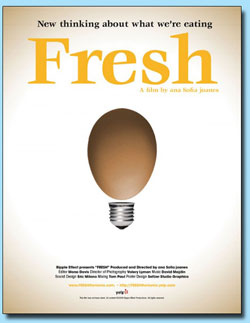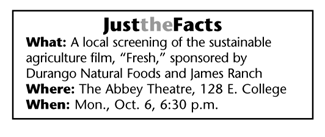|
| ||||
| A ‘Fresh’ perspective
by Willie Krischke "Fresh” isn’t so much a documentary as an opinion piece, championing the sustainable farming movement that is growing in America. It doesn’t have anything nice to say about commercial farming and agricultural techniques, though it primarily lets its images do the talking – row upon row of caged, sick-looking chickens with their beaks cut off, giant vats of pesticide and fertilizer, gruesome processing plants where chickens’ innards are removed by evil-looking robotic hands – and an endless parade of uber-processed food being scanned at the grocery store, including marshmallows, Tang and hot dogs. What’s in this stuff anyway? Is it really food? We are told by a talking head that most commercial farming practices are based on manufacturing models – assembly lines, economy of scale, etc. – but that this method just isn’t going to work long term for the way we grow our food. It creates “monocultures” – too many of one kind of animal in one place – and monocultures are bad, always and forever. Nature hates them, and that’s why plagues and other natural disasters happen, like flash floods and forest fires. Big, monoculture farms only survive because they stave off Mother Nature with a never-ending stream of toxic chemicals – antibiotics, fertilizers and pesticides. A better way to farm is the way our grandparents and great grandparents farmed – a few pigs, some chickens, some corn and beans in the field, and a cow for milk and another for meat. We go forward by looking back. It’s all about balance. In contrast to the machines that represent commercial farming, “Fresh” introduces us to a handful of real, in-the-flesh farmers who have rejected the dominant paradigm and are making it work the old way – with small, diversified farms. We meet, among others, Joel Salatin, a fiery sustainable-farming evangelist from Virginia. Salatin is well-spoken and passionate, and we hear him giving radio interviews and arguing with commercial farmers about feeding cows to cows. He gets a little kooky at times – talking about the “chickenness” of chickens and calling his laying hens his farming “teammates,” but his farm is beautiful and looks healthy, as does he, and his large family. There’s also Russ Kremer, a commercial pig farmer who changed his tune after he almost died from an infection he got from a pig bite. The pigs were so loaded up on antibiotics, that the bacteria that colonized his leg were resistant to everything the doctors threw at them. When he got out of the hospital, he got rid of his entire herd and started over, organic this time. I would, too.
But perhaps the most interesting person we meet is Will Allen, a giant of a man with Incredible Hulk arms. He runs a small farm in the middle of urban Milwaukee – in a place one of the talking heads calls a “food desert,” where it’s easier to find super-processed foodlike substances, such as Ramen noodles and gummy bears, than it is to find an apple or a carrot. Allen makes fresh food available to those who wouldn’t have it otherwise, gives tours of his farms and greenhouses, and gives away worms to people who promise to start their own gardens. One of his converts tells us that when she first came to his farm, she didn’t like the food because it was “too fresh” – she had grown so used to eating fast food and frozen vegetables, the real thing just didn’t taste right. That’s hard to imagine. Sometimes “Fresh” does try too hard – at one point, Salatin tries to convince us that sustainable farming is actually cheaper and more profitable, because you don’t have to spend all that money on antibiotics and fertilizer and pesticides. But then, within the space of five minutes, someone else tells us that organic, locally grown food costs more because it’s worth more – all the nutrients haven’t been sucked out of it like commercial food. But if it’s cheaper to produce shouldn’t it be cheaper to buy as well. But “Fresh” doesn’t really try to be balanced or objective – this is a celebration of sustainable farming more than it’s a journalistic look at a (somewhat) controversial issue. We never really meet anyone from the “other side,” the corporations that drive the commercial farming industry. We do meet a couple of commercial farmers, only identified as Mr. and Mrs. Fox, who raise chickens by the thousand. But the more they talk, the more it becomes clear that they’re not really happy with the way things work, either. They’re up to their necks in debt and are forced to sign a seven-year contract with an industrial chicken supplier in order to keep their heads above water. By the end, they seem about six seconds away from switching to sustainable farming practices themselves. “Fresh” makes its case powerfully, smoothly and convincingly: as a movie, it’s undoubtedly well-made, and as a documentary, it doesn’t pull any dirty tricks or engage in manipulation or fancy editing. It’s one-sided, but doesn’t pretend to be otherwise, and I can respect that. But there’s probably another side to this argument that’s absent from this documentary. I encourage you to attend next Monday’s one-night-only screening, participate in the discussion that happens afterwards, and if you can, take a commercial farmer or agriculture major with you, so that you get both sides. •
|



